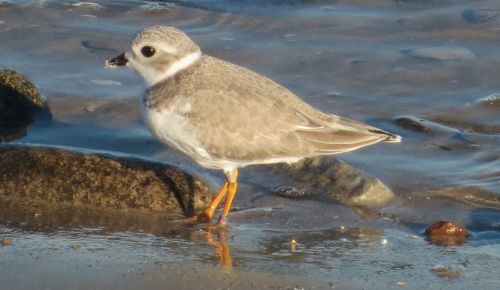Piping Plover recovery on Huron

Piping Plover is an endangered species that nests on beaches in the Great Lakes. In 2007, a pair of Piping Plovers nested at Sauble Beach, Ontario. This was the first known nest of this species in the Ontario portion of the Great Lakes since the mid- 1970s.
Since that time, Piping Plover have continued to nest at Sauble Beach and also at Wasaga Beach, Oliphant, Carter Bay (on Manitoulin Island) and Port Elgin. In 2014, there were three locations, a total of eight pairs and 13 chicks fledged. Port Elgin was a new location.
Piping Plover is a small shorebird, identified by its dark neck–band, dark band between the eyes, orange legs and orange beak with a black tip (an image of the adult can be found on page 3). They lay their eggs in a nest on the beach, called a scrape. The adult male and female take turns incubating the eggs for approximately 28 days. Chicks are mobile right away and forage on the beach along with the adults. Both the adults rear the chicks, which are able to fly at around 4-5 weeks of age.
Threats to the species include habitat destruction, human disturbance and predation. Provincial and federal agencies strive to manage the threats that persist on the breeding grounds in order to protect adults, nests and juveniles and to increase fledgling success.
In addition to these activities, volunteer programs have been developed at both Sauble Beach and Wasaga Beach. Dedicated volunteers share information about Piping Plovers with beachgoers. They also take part in reporting sightings and recording observations.
The recovery of this species is a multifaceted program that combines habitat protection, threat mitigation, education and outreach, inventory and monitoring, scientific study and local stewardship. The success of the Piping Plover recovery program is not only linked to reducing threats and increasing the fledgling success rate but it is also attributed to habitat protection and the conservation of dune grassland ecosystems in the Great Lakes. Piping Plovers rely on these habitats to breed and raise their young. Beach stewardship and the protection and restoration of these environments is critical to the success of this recovery program.
If you would like to assist with the Piping Plover recovery program please visit PloverLovers.com or contact Craig Todd at the Ontario Ministry of Natural Resources and Forestry at (519) 371- 8465, craig.todd@ontario.ca.
